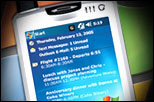Melbourne Uni roots for Windows Mobile, ditches RIM

The University of Melbourne has chosen to implement Windows Mobile Direct Push e-mail system for its 250 executives instead of a BlackBerry equivalent, after conducting a trial amongst staff.

Previously, each department managed its own IT support for mobile devices. The most common mobile e-mail device in place, used by around 30 to 40 of the university's employees, was RIM's BlackBerry. However, the university was also using other types of devices, making it difficult to organise anything centrally.
Greg Morgan, the university's manager of IT services, said his tech team could offer better support if everyone was brought under the same system with the same software.
The choice came down to Direct Push on Windows Mobile and Microsoft Exchange and an alternative built around BlackBerry devices. A trial was run with 15 executives, where they would use one system for a couple of days and then switch the SIM out of their device and trial the other.
At the end of the trial, Windows Mobile won out with the majority of executives, according to Morgan. "Both technologies were very good, but in the end we had to pick the one that gave us the most advantages — and that was undoubtedly Windows Mobile 5.0," Morgan said.
The executives liked being able to access the Internet, use applications to read and edit attachments, use voice play back and the built-in camera, Morgan said. A key advantage to the platform was the greater familiarity of staff with a Windows environment, he said.
From an IT support view, Windows Mobile also won points, he said. "In terms of ease of use and integration into our current environment, Windows Mobile proved to be simple," Morgan told ZDNet.com.au. At the time, the university was implementing Microsoft Exchange Server 2003 across the organisation, which meant that the university did not have to install any other software to get remote capability.
With Windows Mobile, he said, it is only necessary to configure the Exchange environment. "If your Web client's working, your mobile devices will as well," he said. However, when using the BlackBerry system — still used by a number of Uni staff — each time an upgrade is carried out on the Exchange environment, he said, testing has to be run on the BlackBerry system to make sure it still works. Since the two companies' releases operate on different timescales, testing becomes even more complex, he said.
Morgan could not say how much the cost of setting up the system was, although the price of the total refresh was significant, he said. "We were due for a tech refresh anyway."
Currently the university supports two models of Windows Mobile device, but a review is underway looking at new devices with Windows Mobile 6, where a panel gets to inspect the devices and vote. At the end of the review, the University will choose three new devices, one at a low price, one at a medium price, and one at the top end.
The executives who want to keep BlackBerry devices are still being supported, Morgan said, but are being encouraged to move to Windows Mobile. There are currently 12 executives who are still using the RIM devices, he said. "They have their own reasons," Morgan said, including not wanting the extra functionalities on top of e-mail.